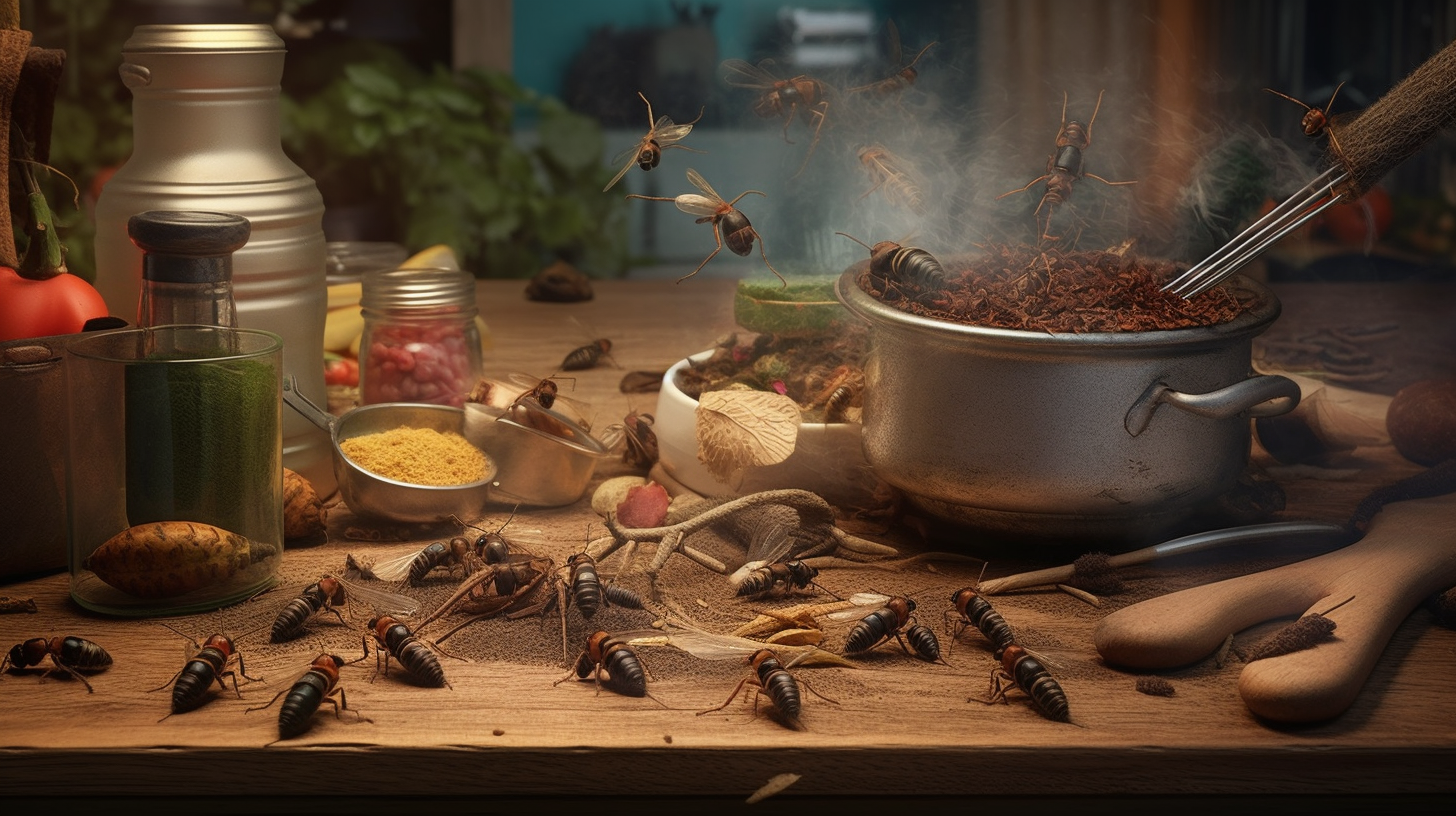
When it comes to pest control, relying on evidence-based methods is crucial for ensuring both safety and effectiveness. Evidence-based pest control uses scientific research and proven techniques to address infestations without causing harm to people, pets, or the environment. By following methods that have been tested and validated, you can confidently eliminate pests while minimizing risks. In contrast, unverified or DIY approaches may lead to incomplete control, increased resistance, or even harmful side effects. This guide explores the importance of using evidence-based solutions for pest management, helping you make informed decisions that protect your home and family while effectively controlling pests.
Understanding Essential Oils and Their Uses in Pest Control
Essential oils have gained popularity as natural alternatives to traditional pest control methods. These plant-based oils are not only known for their pleasing aromas but also for their potential to repel insects and other pests. However, it’s important to understand how essential oils work and whether they can truly serve as effective pest control solutions. This section will explore what essential oils are and how they are believed to affect pests through their natural chemical compounds.
What Are Essential Oils?
Definition and Origins of Essential Oils
Essential oils are highly concentrated extracts derived from various parts of plants, including leaves, stems, flowers, bark, and roots. These oils capture the plant’s natural fragrance and chemical compounds, making them a powerful resource for various uses. The practice of extracting essential oils dates back thousands of years, with many cultures using them for their medicinal, aromatic, and therapeutic properties.
Extracted from Plants, Known for Their Concentrated Fragrances and Natural Properties
Essential oils are renowned for their potent, concentrated fragrances. Popular essential oils like lavender, peppermint, eucalyptus, and tea tree are extracted using methods such as steam distillation or cold pressing. Because of their strong natural properties, essential oils are commonly used in aromatherapy to promote relaxation, in cleaning products for their antimicrobial qualities, and in holistic health practices for their perceived healing effects.
Commonly Used in Aromatherapy, Cleaning, and Holistic Health Practices
In addition to pest control, essential oils are widely used in aromatherapy, where they are believed to influence mood and well-being through inhalation. They also find applications in household cleaning products due to their antibacterial and antifungal properties. Furthermore, many people use essential oils in holistic health practices, believing that these natural extracts can support physical and mental health.
How Essential Oils Are Thought to Work Against Pests
The Natural Chemical Compounds in Essential Oils Believed to Repel Insects
The effectiveness of essential oils in pest control is thought to lie in their natural chemical compounds. These compounds are produced by plants to defend against herbivores and pests in their natural environments. When applied in pest control, these same compounds are believed to act as repellents, keeping insects and pests away from treated areas.
Terpenes, Phenols, and Alcohols as Active Agents
Terpenes, phenols, and alcohols are the primary chemical agents in essential oils that may help repel pests. Terpenes, found in oils like peppermint and citronella, are responsible for the strong odors that pests tend to avoid. Phenols, such as those in tea tree oil, possess antimicrobial properties that may disrupt the environments where pests thrive. Alcohols in oils like lavender can also act as deterrents by interfering with the biological processes of pests.
Their Effect on Insects’ Sensory Systems, Such as Scent Receptors
Essential oils are believed to work by disrupting the sensory systems of insects, particularly their scent receptors. Many pests rely on scent to locate food, mates, or shelter, and the potent fragrances of essential oils may overwhelm or mask the environmental cues they depend on. For example, citronella oil is commonly used to repel mosquitoes because it interferes with their ability to detect carbon dioxide and body odors, which they use to find humans and animals.
Essential Oils That Are Commonly Used for Pest Control
Essential oils are gaining popularity as natural alternatives for pest control. Their strong scents and natural chemical compounds make them effective in repelling various pests, from insects to rodents. By understanding which essential oils work best for specific pests, homeowners can use these solutions as part of a safe and environmentally friendly pest management strategy. This section highlights the essential oils most commonly used in pest control and how they target different types of pests.
Popular Essential Oils for Repelling Insects
Many essential oils are known for their ability to repel insects due to their strong fragrances and active natural compounds. These oils are often used in homemade sprays or diffused in living spaces to create a barrier that pests find unpleasant. Below are some of the most commonly used essential oils for repelling a range of insects.
Peppermint Oil: Repels Ants, Spiders, and Mosquitoes
Peppermint oil is one of the most popular essential oils for pest control, particularly for repelling ants, spiders, and mosquitoes. The strong menthol scent of peppermint oil overwhelms the scent receptors of insects, making it difficult for them to navigate or find food sources. A few drops of peppermint oil mixed with water can be sprayed around windows, doors, and entry points to deter these pests from entering your home.
Lavender Oil: Effective Against Moths, Fleas, and Flies
Lavender oil is widely known for its pleasant fragrance, but it also acts as an effective insect repellent, particularly against moths, fleas, and flies. Lavender’s natural properties make it a great choice for keeping moths away from clothing or linens and for reducing flea infestations in homes with pets. Additionally, its calming scent can be a bonus for homeowners seeking a pest solution that also promotes relaxation.
Eucalyptus Oil: Used to Repel Mosquitoes, Ticks, and Flies
Eucalyptus oil is commonly used in pest control for its ability to repel mosquitoes, ticks, and flies. The strong, medicinal scent of eucalyptus oil deters these pests by interfering with their ability to detect the carbon dioxide and sweat that attracts them to humans. Eucalyptus oil can be applied in sprays or used in diffusers to create a pest-free environment in outdoor areas.
Tea Tree Oil: Known to Deter Mosquitoes and Some Biting Insects
Tea tree oil is another powerful essential oil with insect-repelling properties, particularly against mosquitoes and some biting insects. The strong antimicrobial and antifungal properties of tea tree oil can also disrupt insect habitats. Applied in a diluted spray or mixed with other oils, tea tree oil creates an effective natural barrier against mosquitoes.
Citronella Oil: Frequently Used to Repel Mosquitoes
Citronella oil is one of the most well-known essential oils for repelling mosquitoes. It is commonly found in candles, sprays, and outdoor torches designed to keep mosquitoes at bay. The oil’s strong citrus scent masks the human odors that attract mosquitoes, making it harder for them to locate targets. Citronella oil is an ideal option for outdoor events or when spending time in mosquito-prone areas.
Lemongrass Oil: Effective Against Mosquitoes and Ants
Lemongrass oil is closely related to citronella and shares many of the same pest-repellent properties. It is highly effective against mosquitoes and ants, thanks to its strong citrus scent, which repels these pests. Lemongrass oil can be sprayed around the home’s perimeter or mixed with other oils to create a potent barrier against insects.
Essential Oils for Rodent Control
While essential oils are most commonly associated with insect control, some oils are also believed to help deter rodents. Their strong, overwhelming scents disrupt the sensitive olfactory systems of rodents, making your home less appealing to mice and rats.
How Some Essential Oils May Help Deter Rodents
Essential oils like peppermint and clove can serve as natural repellents for rodents. Rodents rely heavily on their sense of smell to navigate and locate food, and the intense aroma of certain essential oils can make them avoid areas where these scents are present.
Peppermint Oil and Its Strong Scent That Is Unpleasant to Rodents
Peppermint oil is highly effective for rodent control due to its potent smell, which is offensive to rats and mice. By placing cotton balls soaked in peppermint oil near entry points or areas where rodents are likely to travel, you can discourage them from settling in your home. The strong menthol scent irritates rodents’ sensitive noses, making your home a less desirable place for them.
Clove Oil and Its Role in Repelling Rats and Mice
Clove oil is another essential oil known for its effectiveness in repelling rats and mice. Its strong, spicy aroma disrupts rodents’ ability to navigate, and they tend to avoid areas where clove oil is present. Like peppermint oil, clove oil can be used in concentrated sprays or applied to cotton balls placed strategically around areas where rodents are a concern.
Scientific Evidence Supporting Essential Oils for Pest Control
Essential oils have gained popularity as natural alternatives for pest control, but their effectiveness is often debated. While some studies suggest that essential oils can repel certain pests, there are limitations to their efficacy, especially compared to traditional methods. Understanding what scientific research says about essential oils and their use in pest control is crucial for making informed decisions. This section will explore peer-reviewed studies on essential oils’ effectiveness in repelling pests, as well as the limitations and gaps in the research.
What Research Says About Essential Oils and Pest Repellency
Overview of Peer-Reviewed Studies on Essential Oils for Pest Control
Several peer-reviewed studies have examined the ability of essential oils to repel insects and other pests. While some oils show promise in deterring specific pests, many findings suggest that their effects are often short-lived and vary depending on the concentration and formulation used.
Peppermint Oil: Studies Show It Can Be Effective Against Ants and Spiders, but Results Are Often Short-Term
Research has demonstrated that peppermint oil can be effective in repelling ants and spiders. A study published in The Journal of Economic Entomology found that peppermint oil disrupted ant trails and deterred spiders from entering treated areas. However, the effectiveness of peppermint oil was short-lived, with the repellent properties diminishing after a few hours, indicating the need for frequent reapplication. While peppermint oil can be useful as a temporary deterrent, it may not be a long-term solution for pest control.
Citronella Oil: Research Indicates That While It Repels Mosquitoes, Its Efficacy Is Limited to Short Periods and Needs Frequent Reapplication
Citronella oil is one of the most studied essential oils for mosquito repellency. According to a study published in Parasitology Research, citronella oil effectively repelled mosquitoes, but its efficacy decreased rapidly after application. The study found that citronella oil provided protection for only 2-3 hours, requiring frequent reapplication to maintain its repellent properties. This short-lived effectiveness limits citronella oil’s practical use in areas with high mosquito activity.
Lavender Oil: Some Studies Suggest Lavender’s Effectiveness Against Certain Flying Insects Like Moths, but Results Vary
Lavender oil has shown some promise in repelling flying insects, particularly moths. A study in The Journal of Insect Science found that lavender oil deterred moths in small, enclosed spaces. However, results varied depending on the concentration and type of lavender oil used, with some formulations proving ineffective. While lavender oil may work in specific cases, such as in enclosed closets or storage spaces, it is not a guaranteed solution for broader pest control.
Limitations and Gaps in Research
Why the Effectiveness of Essential Oils May Be Inconsistent
Despite promising results in some studies, the effectiveness of essential oils for pest control remains inconsistent. Variability in the concentration, purity, and formulation of essential oils can impact their efficacy. For example, some commercially available essential oil products may be diluted or mixed with other ingredients, reducing their potency. Additionally, differences in the way oils are applied (sprays, diffusers, or directly to surfaces) can lead to varying results.
Variability in Oil Concentration and Formulation
One of the main challenges in assessing the effectiveness of essential oils is the inconsistency in concentration and formulation. Not all essential oils are created equal, and their strength can vary significantly depending on how they are processed and stored. Some studies use pure, concentrated oils, while others rely on diluted formulations, making it difficult to compare results or gauge their true effectiveness in real-world scenarios.
Essential Oils Tend to Have Short-Lived Effects, Requiring Frequent Application
One consistent finding across multiple studies is that essential oils tend to have short-lived effects. Oils like peppermint and citronella may repel pests initially, but their potency fades after a few hours. This means that frequent reapplication is necessary to maintain any repellent benefits, which can be impractical for long-term pest control. Traditional chemical repellents tend to offer longer-lasting protection, which is why essential oils may not be suitable as a sole method for controlling pests.
Lack of Long-Term Studies on the Safety and Effectiveness of Essential Oils for Pest Control in Residential Environments
There is a notable lack of long-term studies on the safety and effectiveness of essential oils for pest control in residential environments. While short-term studies show that essential oils can be effective in specific settings, there is limited research on their long-term impact on pests or their safety when used in high concentrations in homes. More research is needed to fully understand the risks and benefits of using essential oils as a pest control strategy, especially in terms of potential health effects on humans and pets.
Advantages of Using Essential Oils for Pest Control
Using essential oils for pest control offers several advantages over traditional chemical-based pesticides. For those seeking a more natural, eco-friendly approach to pest management, essential oils provide an effective alternative with fewer risks to humans, pets, and the environment. In this section, we’ll explore the benefits of using essential oils and how to apply them safely in your home to keep pests at bay.
Natural and Eco-Friendly Pest Control
Benefits of Using Essential Oils Over Chemical-Based Pesticides
One of the primary advantages of essential oils is their natural origin, which makes them a healthier option for pest control compared to chemical-based pesticides. Essential oils are derived from plants and contain no synthetic chemicals, making them ideal for homeowners looking to avoid introducing harmful substances into their living spaces.
Non-toxic to Humans and Pets (in Appropriate Concentrations): When used in the correct concentrations, essential oils are generally safe for humans and pets, making them a preferable choice for households where safety is a concern. Unlike chemical pesticides, which can pose health risks, essential oils like peppermint, lavender, and citronella are less likely to cause toxic reactions when applied properly.
Environmentally Friendly and Biodegradable: Essential oils break down naturally in the environment, unlike many chemical pesticides that persist and accumulate in soil and water. This makes essential oils a more sustainable pest control solution, as they have minimal negative impact on the environment and do not contribute to long-term pollution.
Minimal Risk of Harmful Chemical Exposure: Many traditional pesticides contain chemicals that can pose health risks through direct contact, inhalation, or ingestion. Essential oils, on the other hand, offer a safer alternative for those looking to avoid harmful chemical exposure. Used in moderate amounts, they can effectively repel pests without contaminating indoor air or leaving toxic residues on surfaces.
Safe Application and Home Use
How to Safely Use Essential Oils for Pest Control in the Home
While essential oils are a natural and safer alternative to chemical pesticides, it is important to use them correctly to avoid irritation, toxicity, or adverse reactions. Proper application techniques ensure you get the most out of your essential oil-based pest control while minimizing any potential risks.
Diluting Essential Oils Properly Before Application to Avoid Irritation or Toxicity: Essential oils are highly concentrated, and applying them undiluted can cause skin irritation, allergic reactions, or toxicity, particularly in sensitive individuals. Always dilute essential oils with water or a carrier oil before using them for pest control. A typical dilution ratio is 10-15 drops of essential oil mixed with a cup of water or a tablespoon of carrier oil, such as coconut or olive oil, to ensure safe application.
Using Spray Bottles for Safe, Easy Application in Pest-Prone Areas: To effectively apply essential oils around your home, use a spray bottle filled with a diluted mixture of water and essential oil. This allows you to easily target pest-prone areas such as windowsills, doorways, and the kitchen without overapplying the oil. A few spritzes in strategic locations can help repel pests without saturating surfaces or releasing too much fragrance into the air.
Avoiding Excessive Use Around Children, Pets, or Those with Allergies: While essential oils are safer than chemical pesticides, they can still cause adverse reactions if overused or applied in concentrated amounts. Use caution when applying essential oils in areas where children, pets, or individuals with allergies may come into contact with them. It’s important to avoid overexposure by applying oils in well-ventilated areas and keeping treated surfaces away from sensitive individuals. When in doubt, consult with a healthcare provider to ensure the oils are safe to use around family members with known allergies or respiratory conditions.
Potential Risks and Drawbacks of Using Essential Oils
While essential oils are popular for their natural and eco-friendly benefits, they are not without limitations. Although they can be an effective short-term solution for pest control, essential oils come with certain drawbacks, including short-lived effectiveness, safety concerns for pets and children, and potential environmental impacts. In this section, we will explore the potential risks and challenges associated with using essential oils for pest management.
Short-Term Effectiveness
Why Essential Oils May Not Be a Long-Term Solution for Pest Control
One of the primary drawbacks of essential oils for pest control is their short-term effectiveness. Essential oils tend to evaporate quickly, reducing their potency over time. While they can be effective in repelling pests immediately after application, the scent—and thus their ability to deter pests—fades relatively fast.
The Need for Frequent Reapplication as Oils Evaporate Quickly: Essential oils require frequent reapplication to maintain their effectiveness. Unlike synthetic pesticides that have long-lasting residual effects, essential oils lose their repellent properties as they evaporate. Homeowners may find themselves needing to reapply oils every few hours or days, depending on the environment and the type of oil used.
Potential for Pests to Return Once the Scent Fades: Once the scent of the essential oil diminishes, pests may return to the area. This temporary solution may not be ideal for those looking for long-term pest control, as it requires consistent maintenance and monitoring. Without reapplication, pests like ants, mosquitoes, and rodents may re-establish themselves in previously treated areas.
Safety Concerns for Pets and Children
Possible Adverse Reactions to Essential Oils, Particularly in High Concentrations
Although essential oils are natural, they can pose risks when used improperly, especially in homes with pets and children. Some essential oils can cause adverse reactions if ingested, inhaled, or applied in high concentrations.
Some Oils, Like Tea Tree and Eucalyptus, May Be Toxic to Pets if Ingested or Applied in Large Quantities: Certain essential oils, such as tea tree and eucalyptus, can be harmful to pets if ingested or absorbed through the skin. Cats, in particular, are sensitive to essential oils, and exposure can lead to symptoms like vomiting, drooling, and respiratory issues. Even dogs may experience adverse effects if they come into contact with concentrated essential oils.
Skin Irritations and Allergic Reactions in Humans from Improper Use or Exposure: In humans, direct contact with undiluted essential oils can lead to skin irritations, rashes, or allergic reactions, especially for those with sensitive skin. Inhaling large amounts of essential oils in enclosed spaces can also cause headaches or respiratory discomfort. To minimize these risks, essential oils should always be diluted before use and applied in well-ventilated areas, particularly when children or individuals with respiratory conditions are present.
Environmental Considerations
Are Essential Oils Always the Eco-Friendly Choice?
While essential oils are generally seen as a greener alternative to synthetic pesticides, their production and use may raise certain environmental concerns. The widespread demand for essential oils has led to sustainability challenges in some cases.
Sustainability Concerns Regarding the Large-Scale Production of Certain Essential Oils: The large-scale production of popular essential oils, such as lavender, eucalyptus, and tea tree, can contribute to unsustainable farming practices. High demand for these oils may lead to overharvesting or monoculture farming, which can deplete natural resources and negatively impact local ecosystems. For this reason, it's important to consider the environmental footprint of the oils being used and opt for sustainably sourced products when possible.
Potential Impact on Wildlife If Oils Are Overused in Outdoor Environments: Overuse of essential oils in outdoor spaces may also have unintended effects on local wildlife. Strong scents can disrupt natural ecosystems, potentially deterring beneficial insects like pollinators or harming sensitive species if oils accumulate in the soil or water. When using essential oils outdoors, it's crucial to use them sparingly and ensure they do not cause harm to the surrounding environment.
FAQs
Contact Bull City Crawlspace Today!
Bull City Crawlspace will do everything we can to ensure your experience with us is excellent.
Request A FREE Estimate
Request a Free Estimate Form
Checkout Recent Post




Got a Question? We’re Here to Help.
You can arrange an appointment or make an enquiry by phone or email, orget in touch to us via our contact form.

